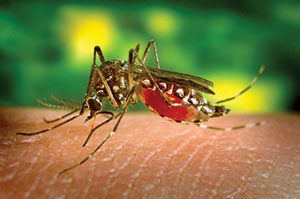
Because West Nile Virus (WNV) has been detected in surrounding communities, the Massachusetts Department of Public Health has raised Somerville’s WNV risk to high. To date, no WNV has been detected in Somerville.
Residents should take precautions to protect themselves against mosquito bites and mosquito-borne diseases, including WNV and Eastern Equine Encephalitis (EEE).
WNV and EEE are usually transmitted to humans through the bite of an infected mosquito. While WNV and EEE can infect people of all ages, people over the age of 50 are at higher risk for severe WNV, and people under the age of 15 are particularly vulnerable to EEE. WNV symptoms and EEE symptoms tend to include fever and flu-like illness.
Residents can take steps to protect themselves and their loved ones from illnesses caused by mosquitoes.
Avoid Mosquito Bites
-
Apply Insect Repellent when Outdoors. Use a repellent with DEET (N, N-diethyl-m-toluamide), permethrin, picaridin (KBR 3023), oil of lemon eucalyptus [p-methane 3, 8-diol (PMD)], or IR3535 according to the instructions on the product label. DEET products should not be used on infants under two months of age and should be used in concentrations of 30% or less on older children. Oil of lemon eucalyptus should not be used on children under three years of age.
-
Be Aware of Peak Mosquito Hours. The hours from dusk to dawn are peak biting times for many mosquitoes. Consider rescheduling outdoor activities that occur during the evening or early morning.
-
Clothing Can Help Reduce Mosquito Bites. Wear long sleeves, long pants, and socks when outdoors to help keep mosquitoes away from your skin.
Mosquito-Proof Your Home
-
Drain Standing Water. Mosquitoes lay their eggs in standing water. Limit the number of places around your home for mosquitoes to breed by either draining or discarding items that hold water. Check rain gutters and drains. Empty any unused flowerpots and wading pools, and change the water in birdbaths frequently.
-
Install or Repair Screens. Keep mosquitoes outside by having tightly fitting screens on all of your windows and doors.
Protect Your Animals
Animal owners should reduce potential mosquito breeding sites on their property by eliminating standing water from containers such as water bowls, buckets, tires, and wading pools – especially after heavy rains. Owners should also speak with their veterinarian about mosquito repellents approved for use in animals and vaccinations to prevent WNV and EEE. If an animal is diagnosed with WNV or EEE, owners are required to report to the Massachusetts Division of Animal Health by calling 617-626-1795 and to the Massachusetts Department of Public Health by calling 617-983-6800.
More information, including all WNV and EEE positive results, can be found on the Arbovirus Surveillance Information web page at mass.gov/dph/mosquito or by calling the Massachusetts DPH Epidemiology Program at 617-983-6800.
















Reader Comments